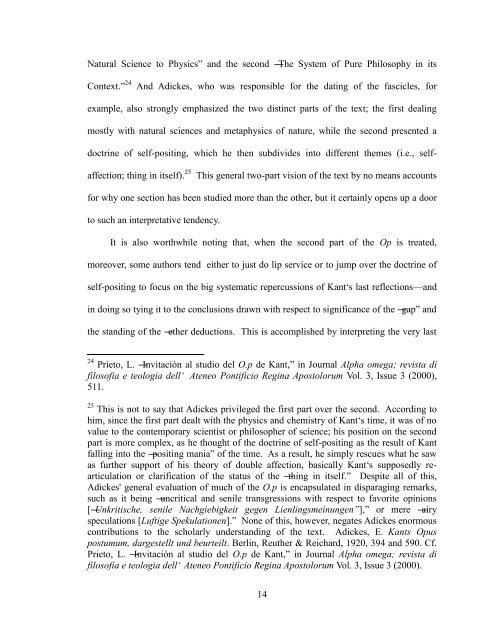The Doctrine of Self-positing and Receptivity in Kant's Late ...
The Doctrine of Self-positing and Receptivity in Kant's Late ...
The Doctrine of Self-positing and Receptivity in Kant's Late ...
You also want an ePaper? Increase the reach of your titles
YUMPU automatically turns print PDFs into web optimized ePapers that Google loves.
Natural Science to Physics‖ <strong>and</strong> the second ―<strong>The</strong> System <strong>of</strong> Pure Philosophy <strong>in</strong> its<br />
Context.‖ 24 And Adickes, who was responsible for the dat<strong>in</strong>g <strong>of</strong> the fascicles, for<br />
example, also strongly emphasized the two dist<strong>in</strong>ct parts <strong>of</strong> the text; the first deal<strong>in</strong>g<br />
mostly with natural sciences <strong>and</strong> metaphysics <strong>of</strong> nature, while the second presented a<br />
doctr<strong>in</strong>e <strong>of</strong> self-<strong>posit<strong>in</strong>g</strong>, which he then subdivides <strong>in</strong>to different themes (i.e., self-<br />
affection; th<strong>in</strong>g <strong>in</strong> itself). 25 This general two-part vision <strong>of</strong> the text by no means accounts<br />
for why one section has been studied more than the other, but it certa<strong>in</strong>ly opens up a door<br />
to such an <strong>in</strong>terpretative tendency.<br />
It is also worthwhile not<strong>in</strong>g that, when the second part <strong>of</strong> the Op is treated,<br />
moreover, some authors tend either to just do lip service or to jump over the doctr<strong>in</strong>e <strong>of</strong><br />
self-<strong>posit<strong>in</strong>g</strong> to focus on the big systematic repercussions <strong>of</strong> Kant‘s last reflections—<strong>and</strong><br />
<strong>in</strong> do<strong>in</strong>g so ty<strong>in</strong>g it to the conclusions drawn with respect to significance <strong>of</strong> the ―gap‖ <strong>and</strong><br />
the st<strong>and</strong><strong>in</strong>g <strong>of</strong> the ―ether deductions. This is accomplished by <strong>in</strong>terpret<strong>in</strong>g the very last<br />
24 Prieto, L. ―Invitación al studio del O.p de Kant,‖ <strong>in</strong> Journal Alpha omega; revista di<br />
filos<strong>of</strong>ia e teologia dell‘ Ateneo Pontificio Reg<strong>in</strong>a Apostolorum Vol. 3, Issue 3 (2000),<br />
511.<br />
25 This is not to say that Adickes privileged the first part over the second. Accord<strong>in</strong>g to<br />
him, s<strong>in</strong>ce the first part dealt with the physics <strong>and</strong> chemistry <strong>of</strong> Kant‘s time, it was <strong>of</strong> no<br />
value to the contemporary scientist or philosopher <strong>of</strong> science; his position on the second<br />
part is more complex, as he thought <strong>of</strong> the doctr<strong>in</strong>e <strong>of</strong> self-<strong>posit<strong>in</strong>g</strong> as the result <strong>of</strong> Kant<br />
fall<strong>in</strong>g <strong>in</strong>to the ―<strong>posit<strong>in</strong>g</strong> mania‖ <strong>of</strong> the time. As a result, he simply rescues what he saw<br />
as further support <strong>of</strong> his theory <strong>of</strong> double affection, basically Kant‘s supposedly rearticulation<br />
or clarification <strong>of</strong> the status <strong>of</strong> the ―th<strong>in</strong>g <strong>in</strong> itself.‖ Despite all <strong>of</strong> this,<br />
Adickes' general evaluation <strong>of</strong> much <strong>of</strong> the O.p is encapsulated <strong>in</strong> disparag<strong>in</strong>g remarks,<br />
such as it be<strong>in</strong>g ―uncritical <strong>and</strong> senile transgressions with respect to favorite op<strong>in</strong>ions<br />
[―Unkritische, senile Nachgiebigkeit gegen Lienl<strong>in</strong>gsme<strong>in</strong>ungen‖],‖ or mere ―airy<br />
speculations [Luftige Spekulationen].‖ None <strong>of</strong> this, however, negates Adickes enormous<br />
contributions to the scholarly underst<strong>and</strong><strong>in</strong>g <strong>of</strong> the text. Adickes, E. Kants Opus<br />
postumum, dargestellt und beurteilt. Berl<strong>in</strong>, Reuther & Reichard, 1920, 394 <strong>and</strong> 590. Cf.<br />
Prieto, L. ―Invitación al studio del O.p de Kant,‖ <strong>in</strong> Journal Alpha omega; revista di<br />
filos<strong>of</strong>ia e teologia dell‘ Ateneo Pontificio Reg<strong>in</strong>a Apostolorum Vol. 3, Issue 3 (2000).<br />
14


